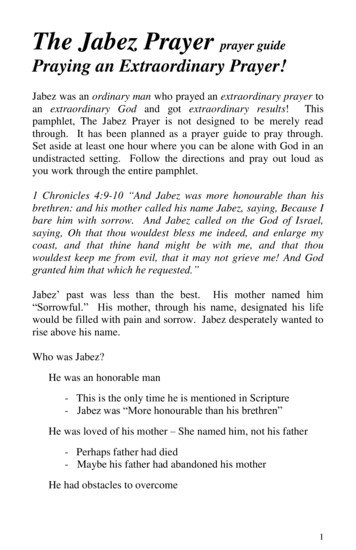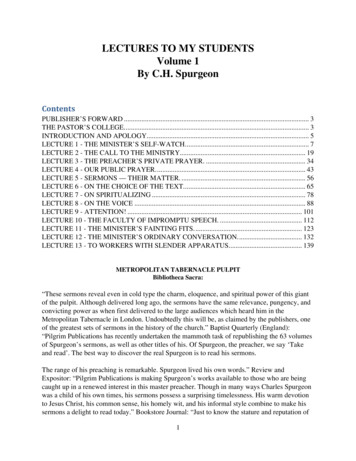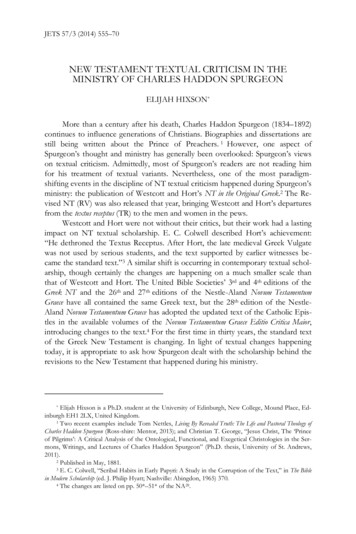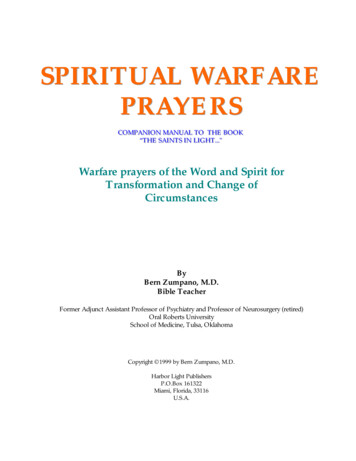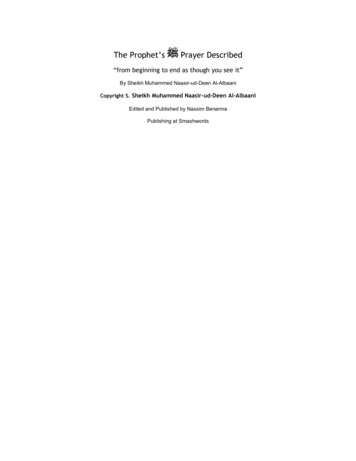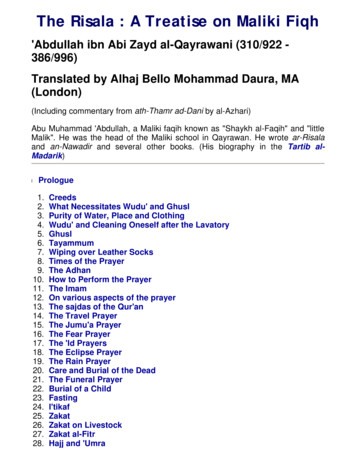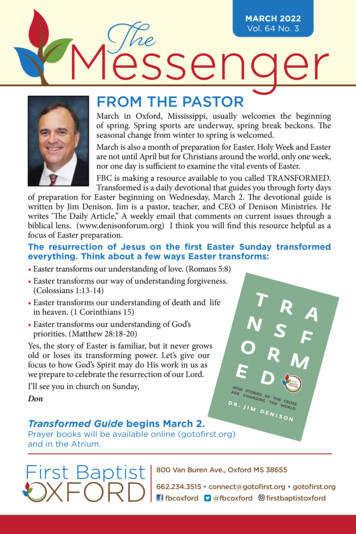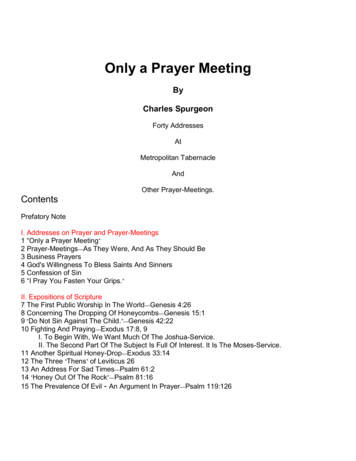
Transcription
Only a Prayer MeetingByCharles SpurgeonForty AddressesAtMetropolitan TabernacleAndOther Prayer-Meetings.ContentsPrefatory NoteI. Addresses on Prayer and Prayer-Meetings1 “Only a Prayer Meeting”2 Prayer-Meetings—As They Were, And As They Should Be3 Business Prayers4 God's Willingness To Bless Saints And Sinners5 Confession of Sin6 “I Pray You Fasten Your Grips.”II. Expositions of Scripture7 The First Public Worship In The World—Genesis 4:268 Concerning The Dropping Of Honeycombs—Genesis 15:19 “Do Not Sin Against The Child.”—Genesis 42:2210 Fighting And Praying—Exodus 17:8, 9I. To Begin With, We Want Much Of The Joshua-Service.II. The Second Part Of The Subject Is Full Of Interest. It Is The Moses-Service.11 Another Spiritual Honey-Drop—Exodus 33:1412 The Three “Thens” of Leviticus 2613 An Address For Sad Times—Psalm 61:214 “Honey Out Of The Rock”—Psalm 81:1615 The Prevalence Of Evil - An Argument In Prayer—Psalm 119:126
16 The Three “Thens” Of Isaiah's Temple Vision—Isaiah 6:1-817 Pruning The Vines—John 15:218 “Write The Name Of Jesus On All Your Crosses.”—John 19:1919 Pentecost And Whitsuntide—Acts 2:1-620 The Pastor's Need Of The People's Prayers—2 Corinthians 1:1121 Why We Have Not—James 4:2III. Incidents And Illustrations22 An Interruption Improved23 Fishing24“Trespassers, Beware!”25 The Silent Steam-Roller26 The Steam-Roller And The Stone-Roller27 Two Common Dangers28 A Little Sermon From The Painter's Brazier29 A Life-Belt For Daily Use30 The Eye, An Emblem Of Faith31 “Nothing To Say”32 Fasting And BackslidingIV. Miscellaneous Addresses33 Preaching To Sinners34 A Full Christ For Empty Sinners And Saints35 “Steal Away To Jesus”36 An Address To Sunday-School Teachers37 Fellowship With God's Greatness38 Timely Cautions39 “Tempted Of The Devil”40 “We Shall Get Home; We Shall Get Home.”41 C. H. Spurgeon's Hymn For An Early Morning Prayer-MeetingPrefatory NoteMr. Spurgeon long ago had the intention of collecting into a volume a selection from the Addressesdelivered by him at the Metropolitan Tabernacle and other Prayer-meetings, but the opportunity ofcarrying out that idea never came to him. It is hoped that the publication of the forty Addresses heregathered together will be helpful to others who have the responsibility of conducting Prayer-meetings,as well as interesting to readers in general because of the variety of subjects discussed in them.In his first volume of “Lectures to my Students,” when speaking upon “The Faculty of ImpromptuSpeech” MR. SPURGEON said:- “Ever since I have been in London, in order to get into the habit of
speaking extemporaneously, I have never studied or prepared anything for the Monday eveningPrayer-meeting. I have all along selected that occasion as the opportunity for offhand exhortation; butyou will observe that I do not, at such times, select difficult expository topics, or abstruse themes, butrestrict myself to simple homely talk about the elements of our faith. When standing up, on suchoccasions, one's mind makes a review, and enquires, 'What subject has already taken up my thoughtduring the day? What have I met with in my reading during the past week? What is most laid upon myheart at this hour? What is suggested by the hymns or the prayers?'”One of the Addresses in this volume - the exposition of Psalm Ixxxi. 16 - was delivered at aPrayer-meeting in New Park Street Chapel in 1857; but most of them were given in the MetropolitanTabernacle, at those wonderful Monday-evening gatherings, concerning which MR. SPURGEON oncewrote in “The Sword and the Trowel” :- “A Wesleyan minister lately said that he was never moresurprised in his life than when he dropped into the Tabernacle, and found the ground-floor and part ofthe gallery filled at a Prayer-meeting. He believed that such a thing was almost without a parallel inLondon, and that it accounted for the success of the ministry. We concur in his impartial judgment.Will not all the churches try the power of prayer?”The second chapter in this book is the only one that was not delivered as an address; but it so wellsets forth Mr. Spurgeon’s opinions of what Prayer-meetings should be, that it is included in order tomake the volume as complete as possible. Other of Mr.Spurgeon’s Prayer-meeting addresses havebeen published in his volumes entitled The Bible and the Newspaper, Be of Good Cheer, Till Hecome, and The Soul-Winner.I. Addresses on Prayer and Prayer-Meetings“Only a Prayer Meeting”What a company we have here to-night! It fills my heart with gladness, and my eyes with tears of joy,to see so many hundreds of persons gathered together at what is sometimes wickedly described as“only a prayer-meeting.” It is good for us to draw nigh unto God in prayer, and specially good to makeup a great congregation for such a purpose. We have attended little prayer-meetings of four or five,and we have been glad to be there, for we had the promise of our Lord's presence; but our minds aregrieved to see so little attention given to united prayer by many of our churches. We have longed tosee great numbers of God's people coming up to pray, and we now enjoy this sight. Let us praiseGod that it is so. How could we expect a blessing if we were too idle to ask for it? How could we lookfor a Pentecost if we never met with one accord, in one place, to wait upon the Lord? Brethren, weshall never see much change for the better in our churches in general till the prayer-meeting occupiesa higher place in the esteem of Christians. To mix it up with the week-night lecture, and really makean end of it, is a sad sign of declension. I wonder some two or three earnest souls in such churchesdo not band themselves together to restore the meeting for prayer, and bind themselves with apledge to keep it up whether the minister will come to it or not. But now that we have come together,how shall we pray? Let us not degenerate into formality, or we shall be dead while we think we live.
Let us not waver through unbelief, or we shall pray in vain. The Lord saith to His Church, “Open thymouth, wide, and I will fill it.” Oh, for great faith with which to offer great prayers! We have beenmingling praise and prayer together as a delicious compound of spices, fit to be presented upon thealtar of incense through Christ our Lord; may we not, at this time, offer some special farreachingpetition? It is suggested to me that we pray for a true and genuine revival of religion throughout theworld. I am glad of any signs of life, even if they should be feverish and transient, and I am slow tojudge any well-intended movement; but yet I am very fearful that many so-called “revivals” have, inthe long run, wrought more harm than good. Places which have had the most of religious excitementare frequently the most difficult to move. Men's minds have been baked hard in the oven offanaticism. A species of religious gambling has fascinated many men, and given them a distaste forthe sober business of true godliness. But if I would nail down counterfeits upon the counter, I do nottherefore undervalue true gold. Far from it. It is to be desired, beyond measure, that the Lord wouldsend a real and lasting revival of spiritual life. We need a work of the Holy Ghost of a supernaturalkind, putting power into the preaching of the Word, inspiring all believers with heavenly energy, andsolemnly affecting the hearts of the careless, so that they may turn to God, and live. We would not bedrunk with the wine of carnal excitement, but we would be filled with the Spirit; we would not leapupon the altar, and shout and cry, “O Baal, hear us!” but we would behold the fire descending fromHeaven in answer to the effectual fervent prayers of righteous men. Can we not entreat the Lord ourGod to make bare His holy arm in the eyes of all the people in this day of declension and vanity?We want a revival of old-fashioned doctrine. Our fear is that, if modern thought proceeds muchfurther, the fashion of our religion will be as much Mohammedan as Christian; in fact, it will be morelike infidelity than either. A converted Jew, staying in London, went into a dissenting chapel which Icould mention; and when he returned to the friend with whom he was staying, he enquired what thereligion of the place could be, for he had heard nothing of what he had received as the Christian faith.The doctrines which are distinctive of the New Testament may not be actually denied in set terms, butthey are spirited away; familiar phrases are used, but a new sense is attached to them.Certain modern preachers talk much of Christ, and yet reject Christianity. Under cover of extolling theTeacher, they reject His teaching for theories more in accord with the spirit of the age. At first,Calvinism was too harsh, then Evangelical doctrines became too antiquated, and now the Scripturesthemselves must bow to man's alteration and improvement. There is plenty of preaching, in thepresent day, in which no mention is made of the depravity of human nature, the work of the HolyGhost, the blood of atonement, or the punishment of sin. The Deity of Christ is not so often assailed,but the Gospel which He gave us, through His own teaching and that of the apostles, is questioned,criticized, and set aside. One of the great Missionary Societies actually informs us, by one of itswriters, that it does not send out missionaries to save the heathen from the wrath to come, but toprepare them “for the higher realm which awaits them beyond the river of death. ” I confess that I havebetter hopes for the future of the heathen than for the state of those who thus write concerning them.The heathen will derive but small advantage from the Gospel which such triflers with the Scripturesare likely to carry them. I know not a single doctrine which is not at this hour studiously undermined
by those who ought to be its defenders; there is not a truth that is precious to the soul which is notnow denied by those whose profession it is to proclaim it. The times are out of joint, and many arehoping to make them more and more so. To me, it is clear that we need a revival of old-fashionedGospel preaching like that of Whitefield and Wesley; to me, preferably that of Whitefield. We need tobelieve: the Scriptures must be made the infallible foundation of all teaching; the ruin, redemption,and regeneration of mankind must be set forth in unmistakable terms, and that right speedily, or faithwill be more rare than gold of Ophir. We must demand from our teachers that they give us a “Thussaith the Lord;” for, at this time, they give us their own imaginations. To-day, the Word of the Lord inthe Book of Jeremiah is true: “Hearken not unto the words of the prophets that prophesy unto you:they make you vain: they speak a vision of their own heart, and not out of the mouth of the Lord. Theysay still unto them that despise Me, The Lord hath said, Ye shall have peace; and they say unto everyone that walketh after the imagination of his own heart, No evil shall come upon you. ” (Jer. xxiii. 16,17.)Beware of those who say that there is no hell, and who declare new ways to Heaven. May the Lordhave mercy upon them! Urgently do we need a revival of personal godliness. This is, indeed, thesecret of church prosperity. When individuals fall from their steadfastness, the church is tossed to andfro; when personal faith is steadfast, the church abides true to her Lord. We have in and around ourown denomination many true-hearted servants of Christ, who are hardly put to it to know what to do.Their loyalty to their Lord and to His truth is greater than their love to sect or party, and they know notwhether to abide in their present position, and fight out the great question, or to lift the old banner,and quit their apostatizing associates. Do whichever they may, it is upon the truly godly and spiritualthat the future of religion depends in the hand of God. Oh, for more truly holy men, quickened andfilled with the Holy Spirit, consecrated to the Lord, and sanctified by His truth! What can beaccomplished by worldly professors, theatre-going churchmembers, semi-infidel teachers, andphilosophical preachers? Nothing but ruin can follow from a preponderance of these. Their presenceis grievous to God, and disastrous to His people. Brethren, we must each one live if the church is tobe alive; we must live unto God if we expect to see the pleasure of the Lord prospering in our hands.Sanctified men are the necessity of every age, for they are the salt of society, and the saviours of therace. The Lord has made a man more precious than a wedge of gold,- I mean, a decided, instructed,bold, unswerving man of God. We deeply want a revival of domestic religion. We have beensaddened at the terrible accounts of the impurity of this city; but, doubtless, one cause of this state ofthings is the neglect of household religion among Christians, and the entire absence of commondecency in many of the lodgings of the poor. The Christian family was the bulwark of goodness in thedays of the Puritans; but, in these evil times, hundreds of families of so-called Christians have nofamily worship, no restraint upon growing sons, and no wholesome instruction or discipline. See howthe families of many professors are as dressy, as gay, as godless as the children of the non-religious!How can we hope to see the Kingdom of our Lord advance when His own disciples do not teach HisGospel to their own sons and daughters? Have we not need to repeat the lament of Jeremiah? “Eventhe sea monsters draw out the breast, they give suck to their young ones: the daughter of my peopleis become cruel, like the ostriches in the wilderness.” How different this is from the father of the
faithful, of whom the Lord said, “I know Abraham, that he will command his children and hishousehold after him, and they shall keep the way of the Lord!”The surest way to promote godliness abroad is to labour for it at home. The shortest method for theoverthrow of priestcraft is for every man to be the priest in his own house, and to warn his sonsagainst deceitful men. May our dear children be so well taught from infancy that they may not onlyescape the common vices of the age, but grow up to become patterns of holiness! This is a greatdifficulty to our poorer friends in this loathsome city, which is becoming as polluted as heathendom. Agood sister, who lives close to this house of prayer, came up from a country town with her little boy,and she was horrified before long to hear him use profane language, being evidently unaware of itsmeaning. He had picked it up in the street close to his mother's door.Where are the children of working-folks to run if they are not able to walk the streets? All around us,vice has become so daring that a blind man may almost be envied; but even he has ears, and will,therefore, be vexed with the filthy conversation of the wicked. Good people say to me, “What are weto do?” I wish those who live in the breezy country village would stop there, and not come into ourclose streets, and lanes, and courts, which reek with blasphemy and dirty talk. Why do working-menso often think it necessary, in their ordinary conversation, to use such abominable expressions, whichhave no useful meaning, and are simply disgusting? If ever Christian people should be pure, andshould watch over their children with a holy jealousy, now is the time, and this is a worthy subject fordaily prayer.I would sooner have the doctrines of grace revived, individual piety deepened, and family religionincreased, than I would watch a frantic crowd parading the street with noisy music, and harshclamour. I see no special virtue in drums and tambourines. Make what noise you will to attract thecareless if you afterwards give them sound instruction in the truth, and make them to know themeaning of the Word of the Lord; but if it be mere stir, and song, and swagger, what is the good of it?If Gospel truth is not taught, your work will be a building of wood, hay, and stubble, soon to beconsumed. Quick building is seldom permanent. Gold, silver, and precious stones are scarcematerial, not easily found; but then they endure the fire. What is the use of religion which comes up ina night, and perishes as soon? Ah, me! what empty bragging we have heard! The thing was done, butthen it was never worth doing; soon things were as if it never had been done; and, moreover, thissham way of doing it made it all the harder toil for the real worker.O Christian men and women, be thorough in what you do, and know, and teach! Hold truth as with aniron grip; let your families be trained in the fear of God, and be yourselves “holiness unto the Lord;” soshall you stand like rocks amid the surging waves of error and ungodliness which rage around you.We want, also, more and more, a revival of vigorous consecrated strength. I have pleaded for truepiety; I now beg for one of the highest results of it. We need saints. It may be that all cannot attainunto “the first three” (1 Chr. 11:21); but we cannot do without champions.
We need gracious minds trained to a high form of spiritual life by much converse with God in solitude.These are the standard-bearers of the army: each one is a king's son. There is an air about them,humble as they are, as of men who breathe a purer atmosphere. Such was Abraham, who, by hiscommunion with God, acquired a more than royal bearing. The king of Sodom shrinks intoinsignificance in the presence of the high-minded sheik who will not take of his lawful spoils from athread to a shoe-latchet, lest the heathen king should say, “I have made Abraham rich.” Saintsacquire nobility from their constant resort to the place where the Lord meets with them. There, also,they acquire that power in prayer which we so greatly need. Oh, that we had more men like JohnKnox, whose prayers were more terrible to Queen Mary than ten thousand men! Oh, that we hadmore Elijahs, by whose faith the windows of Heaven should be shut or opened! This power comes notby a sudden effort; it is the outcome of a life devoted to the God of Israel. If our life is all in public, itwill be a frothy, vapoury, ineffectual existence; but if we hold high converse with God in secret, weshall be mighty for good. The Puritans were abundant in meditation and prayer; and there were giantson the earth in those days. He that is a prince with God will take high rank with men, after the truemeasure of nobility. May the Lord send us many self-contained Christians, whose godliness leans onGod for itself, and is not a second-hand affair! We see too many Christian people depending uponone another, like houses run up by “jerry-builders”, which are so slenderly built that, if you were to pulldown the last one in the row, they would all follow. Beware of being a lean-to; endeavour to rest onyour own walls of real faith in the Lord Jesus. I tremble for a church whose continuance dependsupon the talent and cleverness of one man. If he is removed, the whole thing will collapse: this is awretched business. May none of us fall into a mean, poverty-stricken dependence on man! We wantamong us believers like those solid, substantial family mansions which stand from generation togeneration as landmarks of the country; no lath-and-plaster fabrics, but edifices solidly constructed tobear all weathers, and defy time itself. Given a host of men who are steadfast, immovable, alwaysabounding in the work of the Lord, and then the glory of God's grace will be clearly manifested, notonly in them, but in those round about them. The Lord send us a revival of consecrated strength, andheavenly energy! May the weakest among us be as David, and David as the angel of the Lord!As for you who are not converted to God, many of you will be caught in the great wave of blessing, ifGod shall cause it to break over us. When saints live unto God, sinners are converted to God. “I wasconverted,” said one, “not by hearing a sermon, but by seeing one.” “How was that?” he was asked.“My next-door neighbour was the only man in the street who went to a place of worship; and, as I sawhim go out as regularly as clockwork, I said to myself, 'That man regards the Sabbath, and the God ofthe Sabbath, and I do not.' By-and-by, I went into his house, and I saw that comfort and order reignedin it, while my room was wretched. I saw how his wife and children dwelt in love, and I said to myself,'This home is happy because the father fears God.' I saw my neighbour calm in trouble, and patientunder persecution. I knew him to be upright, true, and kind, and I said to myself, ' I will find out thisman's secret,' and thus I was converted.” Preach by your hands if you cannot preach by yourtongues. When our church-members show the fruits of true godliness, we shall soon have enquiriesfor the tree which bears such a crop.
Dear friends, at our prayer-meetings of late, our Lord has very graciously spoken to one and anotherof the unconverted among us. What a mercy that they were so far interested as to come! We havenot said very much to them, but we have been praying for them; and we have talked of the joys of ourholy faith, and one after another they have quietly given their hearts to God while in theprayer-meeting. I feel very glad about it; it was all that we needed to make these meetings the gate ofHeaven. Such conversions are specially beautiful, they are so altogether of the Lord, and are somuch the result of His working by the whole church, that I am doubly delighted with them. Oh, thatevery gathering of faithful men might be a lure to attract others to Jesus! May many souls fly to Himbecause they see others speeding in that direction! Why not? The coming together of the saints is thefirst part of Pentecost, and the ingathering of sinners is the second. It began with “only aprayer-meeting,” but it ended with a grand baptism of thousands of converts. Oh, that the prayers ofbelievers may act as loadstones to sinners!There are a few among us who are not saved, and but a few. I do not believe they will long escapethe saving influence which floods these assemblies. We have made a holy ring around certain ofthem; and they must soon yield to our importunity, for we are pleading with God as well as with them.Their wives are praying for them, their brothers and sisters are praying for them, and others are in thedevout confederacy; therefore they must be brought in. Oh, that they would come at once! Why thisreluctance to be blessed? Why this hesitation to be saved? Lord, we turn from these poor foolishprocrastinators to Thyself, and we plead for them with Thine all-wise and gracious Spirit! Lord, turnthem, and they shall be turned! By their conversion, prove that a true revival has commenced tonight!Let it spread through all our households, and then run from church to church till the whole ofChristendom shall be ablaze with the Heaven descended fire! Let us pray.Prayer-Meetings;As They Were, And As They Should BeAmong the faults, which have largely disappeared from prayer-meetings as they used to beconducted in my early days, these were the principal ones. First, the excessive length of the prayers.A brother would fix himself against the table-pew, and pray for twenty minutes or half-an hour, andthen conclude by asking forgiveness for his shortcomings,-a petition which was hardly sanctioned bythose who had undergone the penance of endeavouring to join in his long-winded discourse. A goodcure for this evil is for the minister judiciously to admonish the brother to study brevity; and if this availnot, to jog his elbow when the people are getting weary. This fault, which is the ruin of all fervency,ought to be extirpated by all means, even at the expense of the personal feelings of the offender.Cant phrases were another evil. “We would not rush into Thy presence as the unthinking horse intothe battle.” As if horses ever did think, and as if it were not better to exhibit the spirit and energy of thehorse rather than the sluggishness and stupidity of the ass. As the verse from which we imagine thisfine sentence to be derived has more to do with sinning than with praying, we are glad that the phraseis on its last legs. “Go from heart to heart as oil from vessel to vessel.” This is probably a quotation
from the nursery romance of ”Ali Baba and the Forty Thieves,” but as destitute of sense, Scripture,and poetry as ever sentence could be conceived to be. We are not aware that oil runs from onevessel to another in any very mysterious or wonderful manner; it is true it is rather slow in coming out,and is therefore an apt symbol of some people's earnestness; but surely it would be better to have thegrace direct from Heaven than to have it out of another vessel,-a Popish idea which the metaphorseems to insinuate, if indeed it has any meaning at all.A very favourite description of the suppliant was, “Thy poor unworthy dust”-an epithet generallyapplied to themselves by the proudest men in the congregation, and not seldom by the most moniedand grovelling, in which case the last two words are not so very inappropriate. We have heard of agood man who, in pleading for his children and grandchildren, was so completely beclouded in theblinding influence of this expression, that he exclaimed, “O Lord, save Thy dust, and Thy dust's dust,and Thy dust's dust's dust!” When Abraham said, “I have taken upon me to speak unto the Lord,which am but dust and ashes,” the utterance was forcible and deeply expressive; but in its misquoted,perverted, and abused form, the sooner it is consigned to its own element, the better. Very manyother perversions of Scripture, uncouth similes, and ridiculous metaphors, will recall themselves tothe reader; we have neither time nor patience to recapitulate them; they are a sort of spiritual slang,the offspring of unholy ignorance, unmanly imitation, or graceless hypocrisy; they are at once adishonour to those who constantly repeat them, and an intolerable nuisance to those whose ears arejaded with them. They have had the most baneful effects upon our prayer-meetings, and we rejoice toassist in bringing them to their deserved and ignoble end.Another evil was, mistaking preaching for prayer. The friends who were reputed to be “gifted” indulgedthemselves in public prayer with a review of their own experience, a recapitulation of their creed, anoccasional running commentary upon a chapter or Psalm, or even a criticism upon the Pastor and hissermons. It was too often quite forgotten that the brother was addressing the Divine Majesty, beforewhose wisdom a display of our knowledge is impertinence, and before whose glory an attempt atswelling words and pompous periods is little short of profanity; the harangue was evidently intendedfor man rather than God, and on some occasions did not contain a single petition from beginning toend. We hope that good men are leaving this unhallowed practice, and are beginning to see thatsermons and doctrinal disquisitions are miserable substitutes for earnest wrestling prayers, when ourplace is before the mercy-seat, and our engagement is intercession with the Most High. Monotonousrepetition frequently occurred, and is not yet extinct. Christian men, who object to forms of prayer, willnevertheless use the same words, the same sentences, the identical address at the commencement,and the exact ascriptions at the conclusion. We have known some brethren's prayers by heart, so thatwe could calculate within a few seconds when they would conclude. Now this cometh of evil. All thatcan be said against the prayers of the Church of England, which were many of them composed byeminent Christians, and are, some of them, as beautiful as they are Scriptural, must apply with tenfoldforce to those dreary compositions which have little virtue left, since their extempore character isclearly disproved. Oh, for warm hearts, burning with red-hot desires which make a channel from thelip in glowing words; then, indeed, this complaint would never be made,- “What is the use of my going
to the prayer-meeting, when I know all that will be said if So-and-so is called on?” This is not anuncommon excuse for staying away; and, really, while flesh is weak, it is not so very unreasonable aplea; we have heard far worse apologies for greater offences. If our (so-called) “praying men” drivethe people away by their constant repetitions, one-half at least of the fault lies at their door.Most of these diseases, we trust, are finding their cure; but the man would be hardy, not to say foolhardy, who should affirm that there is now no room for further improvement. “Advance” must still beour motto, and in the matter of the prayer-meeting it will be found most suitable. Our brethren willexcuse our offering them advice, and must take it only for what it is worth; but having to superintend alarge church, and to conduct a prayer-meeting which scarcely ever numbers less than from athousand to twelve hundred attendants, we will simply give our own notions as to the most efficientmethod of promoting and sustaining these holy gatherings.1. Let the minister himself set a very high value upon this means of grace. Let him frequently speak ofit as being dear to his own heart; and let him prove his words by throwing all his vigour into it, beingabsent as seldom as possible, and doing all in his power to give an interest to the meeting. If ourpastors set the ill example of coming in late, of frequently staying away, or conducting theengagements in a drowsy, formal way, we shall soon see our people despising the exercise, andforsaking the assembling of themselves together. A warm-hearted address of ten minutes, with a fewlively words interposed between the prayers, will do much, with God's blessing, to foster a love tor theprayer-meeting.2. Let the brethren labour after brevity. If each person will offer the petition most laid upon his heart bythe Holy Spirit, and then make room for another, the evening will be far more profitable, and thepra
41 C. H. Spurgeon's Hymn For An Early Morning Prayer-Meeting Prefatory Note Mr. Spurgeon long ago had the intention of collecting into a volume a selection from the Addresses delivered by him at the Metropolitan Tabernacle and other Prayer-meetings, but th e opportunity of carrying out that idea never came to him.

